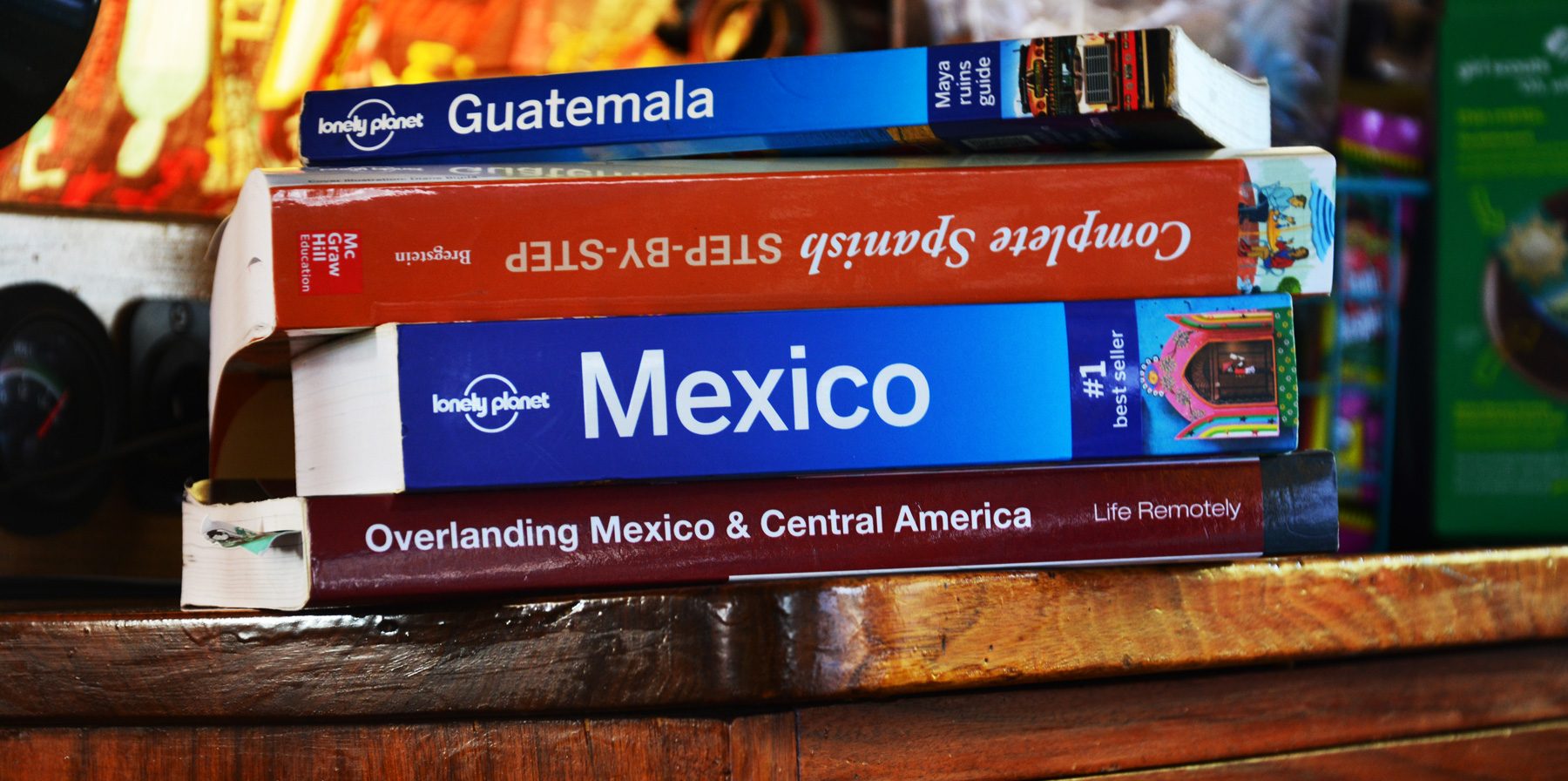Do we speak Spanish? As we get closer and closer to Central America, this question becomes ever more important. How do we plan on learning, and why is it so important to us in the first place?
Hablamos Español? Do either of you guys speak Spanish? We have been asked this question a lot. And an important question it is, as our departure towards Central and South America looms closer and closer. Come March, we will finally
cross the border to Latin America, and
leave behind a cultural and lingual sphere that we are familiar with. Then, most of our interactions with other people will be in a different language: Spanish. A language shared by most of the Latino world, all the way down to Argentina.
The short answer is simply: yes, Sven speaks Spanish. In 2010, he spent a semester at the University of Temuco in Chile, where he learned to speak Chilean Spanish. We are also fortunate enough that Sven speaks Brazilian Portuguese; he spent another semester during college in Natal, Brazil. This will come in very handy when we visit Brazil, the only country on our itinerary where Portuguese will be on the menu instead of Spanish.
Sven speaks Spanish, I’m still learning

Learning languages has been an important factor in our lives for a number of years. The inside of our Bus is decorated with German refrigerator magnets. “Leb deinen Traum” translates to “live your dream”.
I do not speak very much Spanish – yet. Like Sven, I also did two exchanges during high school and college; my first one was to Germany, the other was to Indonesia – but neither German nor Indonesian will be very useful in Central or South America. I made a few meager attempts at beginner’s Spanish during college, but my lessons were always interrupted by other classes or life factors. I have begun to learn it again over the past few months and weeks, and will continue to do so as we travel through Latin America.
And one of the most interesting questions is how I will learn the language. Despite the fact that I bought a copy of Complete Spanish Step-by-Step and am dutifully making flash cards for newly-learned words, I am a very strong believer in what us language-learning nerds call language immersion.
Language immersion: surround yourself with Spanish
 Language immersion
Language immersion means learning a language by surrounding yourself with it, using it (and nothing else) no matter how little is at your disposal, and making mistakes to continue learning. This means the focus is not on whether you are using the language correctly or incorrectly, but rather if you can successfully communicate with your conversation partner. As important as foreign language classrooms are in school, I truly believe that immersing yourself is the most effective and quickest way to learn a language. So, my solution to finally learning Spanish? Spend over two years traveling through Latin America and using it.
Of course, this is easier said than done. Despite everything we may think now, it is very difficult to always speak a foreign language to a loved one. Sven and I plan on doing our best to also speak Spanish with each other, but often it will be more convenient and faster to communicate in one of the languages we know better (English or German). The most important lessons will come when we speak with locals we meet along the way. In the process, both a lot of frustration and a lot of discipline are to be expected.
Why was learning Spanish so important, anyway?
So why is learning this language worth so much frustration? What makes me so determined to learn Spanish? Many people travel the
Panamericana without knowing more than a few words of Spanish. In fact, people travel all around the world, all the time, and feel that they need only rely on English as the common
lingua franca.

Que esta en la Kombi? What’s in the Bus?
Learning a new language was, in fact, one of the major reasons we decided to travel along the Panamericana in the first place. It was one of three factors that we deemed most important for our choice of itinerary. In comparison to the other option we considered – Australia – the Panamerican Highway offered us the chance to learn a foreign language better than we ever had before, and would offer us a wide span of countries to do it in that were all within a common language area.
For us, learning the language of the place we are spending a significant amount of time in is a key factor to getting to know a place – and even more importantly, it is a key factor to getting to know the people. I personally believe I can never get to know – really get to know – a person and what they really mean if I do not understand the cultural context they are coming from. There are concepts that just don’t translate. And even if they translate, they do not translate well enough to replace the original idea.
An example of German Brötchen

A very fancy German breakfast. Brötchen can be seen in the basket in the back. A Brötchen sliced down the middle can be seen on my plate in the foreground.
Let me give you an example, using a cultural phenomenon I am much more familiar with: the German concept of Brötchen.
Germans are really big on bread; it is their most staple food. Brötchen basically translates to “little bread”, and is effectively a roll. But it is not enough to understand that Brötchen are just rolls – they have a much deeper and more important meaning to most German people than that.
Brötchen is a food you can eat at any meal time, and are often the go-to food whenever you don’t know what else you want to eat. Sweet or savory, you can eat almost anything on it (including, for example, raw ground beef – a dish I never learned to favor).You always slice them lengthwise, down the middle. Don’t you dare make the faux pas of ripping pieces off, or – god forbid – just biting into it (unless is has a sausage in it, like a hotdog). That’s just not how Germans do the Brötchen thing.
It’s not about the words, it’s about the context
My point, however, is that it is not enough to just know what the word for Brötchen is – you have to know all this context stuff around it to understand the significance of this word for a German-speaker. Details are important. And the only way to actually understand all of this, in its most pure, unadulterated form, is to be able to talk about Brötchen in the language it was born in.
To broaden this example: I believe the only way to truly understand a person is to understand words like Brötchen. You have to know the context of what they are talking about, which is always altered by translation. If I don’t even know that a phenomenon like Brötchen exists, how can I ever talk to someone about it and understand what it really means to them? The only way to get to really know a person is to speak their language to the best of my ability. It is not just about practicality (it’s not just that I want to know what Brötchen are on the menu and if I would like one or not), it is about doing my utmost to understand the other person (it is also about understanding that if a German-speaker just bites into his Brötchen, he is probably extremely overly hungry and should be fed immediately).

Big Emma is working on her Spanish, too! By the time we get to Argentina (where we will visit a good friend, Mau) she will be able to have whole conversations.
By the time we get to Argentina
So I will do the best I can to learn Spanish. I may not become a brilliant writer or a poet, but I want to be able to communicate to the best of my ability with everyone we meet down the line. Of course, there are also countries we intend to visit in Latin America that do not speak Spanish besides the aforementioned Brazil. The people of French Guyana speak French, Dutch is the main language spoken in Suriname, and there are all kinds of native languages in almost any country, not to mention very high rates of multilingualism. But Spanish is by far the most widespread, and a realistic goal to set for myself by the time we get to Argentina.

 Language immersion means learning a language by surrounding yourself with it, using it (and nothing else) no matter how little is at your disposal, and making mistakes to continue learning. This means the focus is not on whether you are using the language correctly or incorrectly, but rather if you can successfully communicate with your conversation partner. As important as foreign language classrooms are in school, I truly believe that immersing yourself is the most effective and quickest way to learn a language. So, my solution to finally learning Spanish? Spend over two years traveling through Latin America and using it.
Language immersion means learning a language by surrounding yourself with it, using it (and nothing else) no matter how little is at your disposal, and making mistakes to continue learning. This means the focus is not on whether you are using the language correctly or incorrectly, but rather if you can successfully communicate with your conversation partner. As important as foreign language classrooms are in school, I truly believe that immersing yourself is the most effective and quickest way to learn a language. So, my solution to finally learning Spanish? Spend over two years traveling through Latin America and using it.







